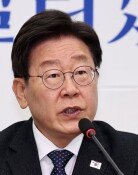S. Korean institute holds forum on N. Koreas regime collapse
S. Korean institute holds forum on N. Koreas regime collapse
Posted May. 25, 2013 07:25,
As North Korean leader Kim Jong Un has sent a special envoy to China and made an awkward proposal for talks, an international conference was held in Washington D.C. on Thursday on the sensitive issue of the settlement of the past of the Norths dictatorship after its collapse.
The Asan Institute for Policy Studies, a South Korean independent think tank, hosted the conference under the theme Transitional Justice in a Reunified Korea: Peace-Building & Reconciliation at Stimson Center in the U.S. capital. About 100 experts on the Korean Peninsula attended the conference.
The transition refers to a regime change in North Korea or the communist countrys collapse and absorption by South Korea. Though such a discussion had been considered a taboo in South Korea for concerns over stimulating Pyongyang, the conference on the theme indicates experts around the world now consider the transition a likely event.
Presenters at the conference called for expecting various situations caused by a contingency incident in the North and drawing up a concrete plan to clean up the dictatorship.
Andrew Natsios, a co-chair of the U.S. Committee for Human Rights in North Korea, said that an issue that required the biggest attention during a transitional period is the retaliatory violence and the safety of people confined at concentration camps. Lavinia Stan, a professor of political science at St. Francis Xavier University in Canada, presented on concrete measures to settle the past, including investigations and punishment of violators, with reference to the cases of Eastern European socialist regimes.
Cho Jeong-hyeon, a researcher at the Korea Institute for National Unification in South Korea, proposed that punishments via judiciary procedures be limited to perpetrators of major international crimes such as crimes against humanity while the rest be investigated by an independent reconciliation committee and pardoned later.







